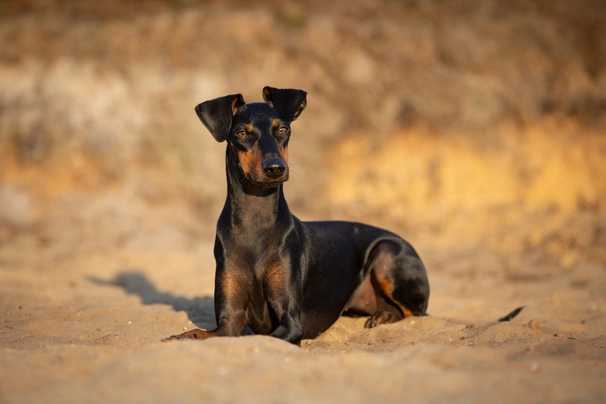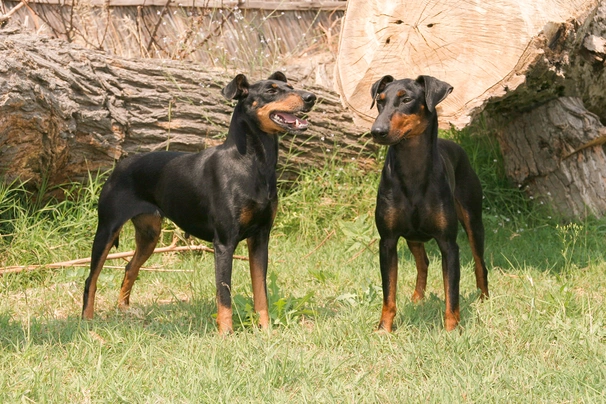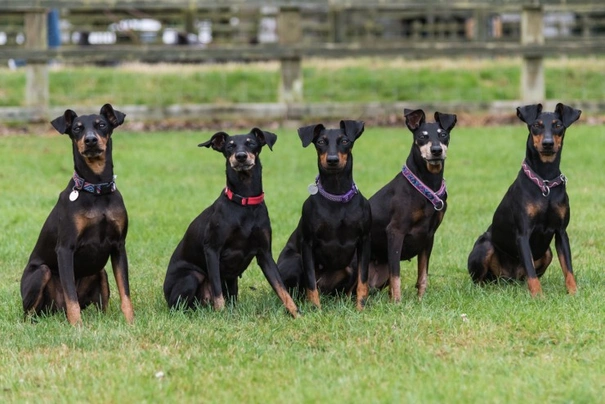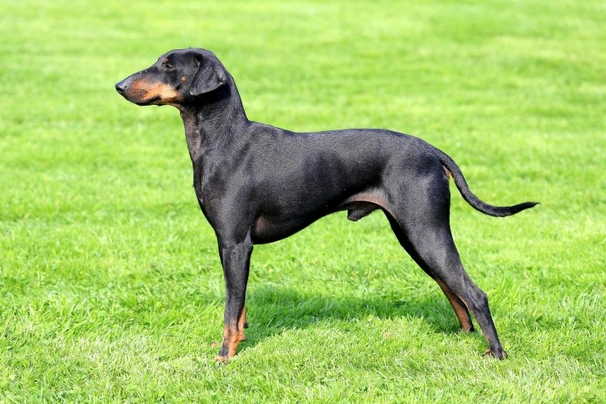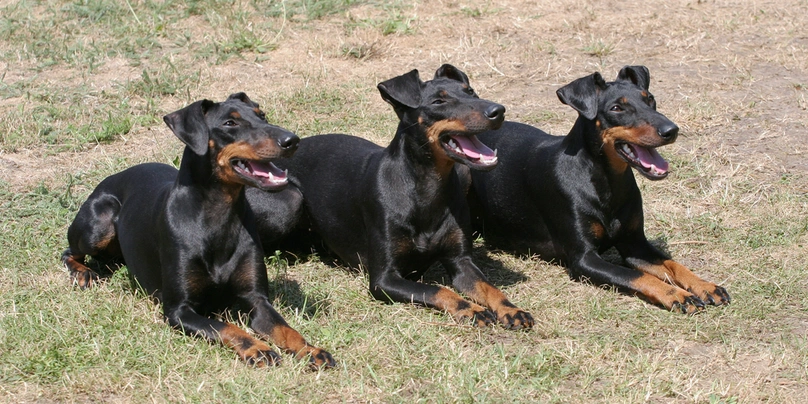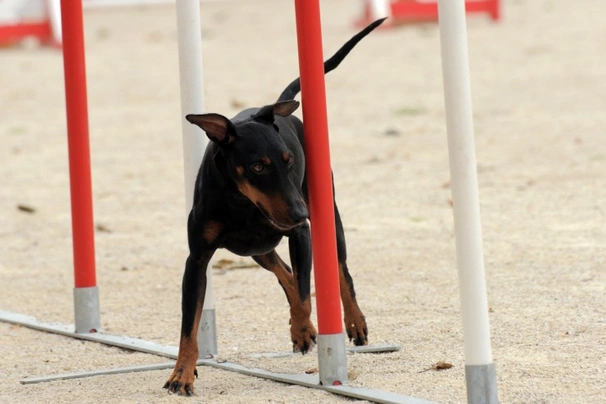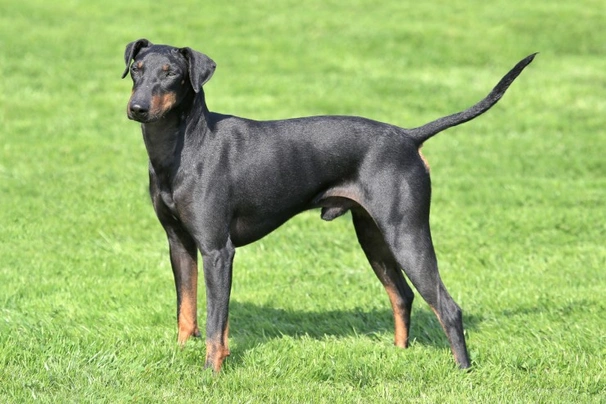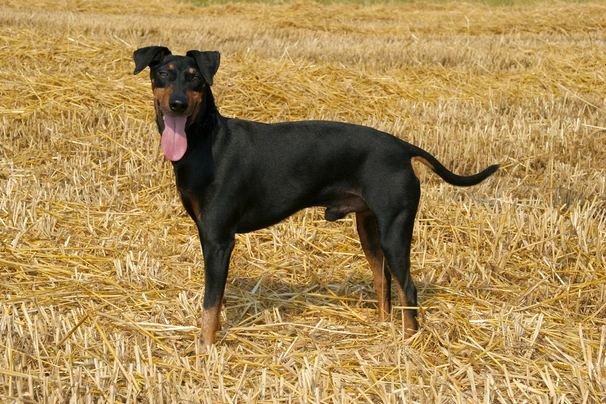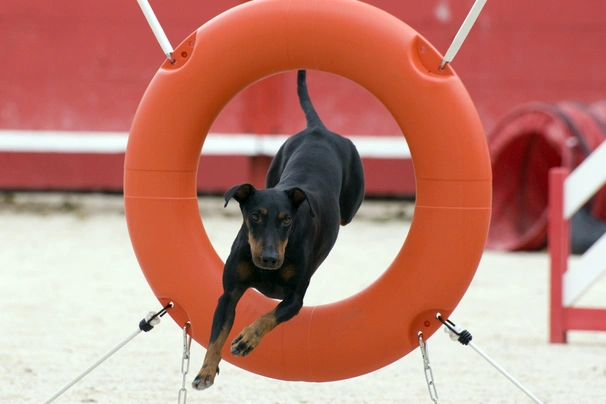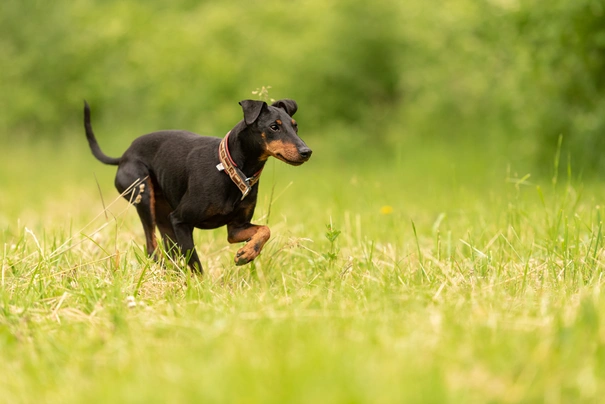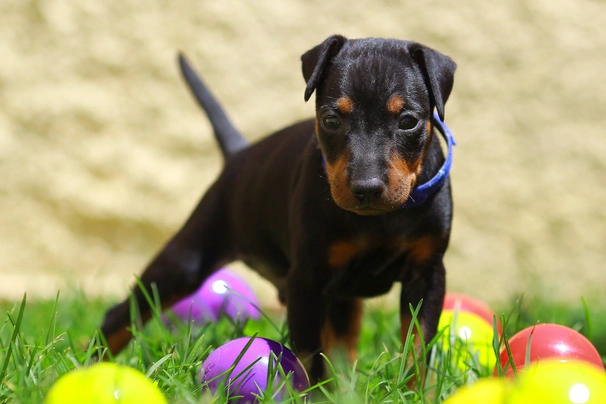Manchester Terrier
Pros
Cons
Introduction of the Manchester Terrier
Often thought of as a “gentleman's terrier” this spirited little terrier has a lot to boast about. Manchester Terriers were originally bred as ratters and for hare coursing but these days they have proved themselves to be superb agility dogs enjoying games like flyball to name but one of the activities they excel at and which they thoroughly enjoy.
They are elegant terriers boast friendly loyal natures but like all terriers they are high-energy and have a high prey drive. You'd be forgiven for thinking they were Doberman Pinschers only in miniature but the Manchester Terrier is very much a breed in its own right. Anyone wishing to share a home with a Manchester Terrier would need to register their interest with breeders and go on a waiting list because few puppies are bred every year and the breed is now on the Kennel Club's native vulnerable breed list.
History of the Manchester Terrier
The actual origins of the Manchester Terrier remain a bit of a mystery and like so many other breeds just how this charming little dog first came about has been lost in the mists of time. With this said the earliest record of a "black and tan" terrier-type little dog first appears in a book known as the "Hours of the Virgin" which is a manuscript that dates right back to the 15th Century. In short the breed is thought to be one of the most "natural" and oldest UK terriers around.
Their ancestors were highly prized during the Tudor period with the first ever written reference having been recorded by Queen Elizabeth I's physician a man called Dr Caius. He described these terriers as being black and tan in colour and that they were extremely good "ratters". There are references of similar terriers throughout the 16th Century and there is a record of a black and tan terrier in a book that was published in 1790 that was written by Bewick called "The General History of Quadrupeds".
A terrier called Jack Black was a famous rat catcher in London during the mid-1800's and was to be named the Royal Rat catcher. Black and tan terriers were very popular throughout the 19th Century thanks to their ratting abilities. But they were also highly prized hunters too and were used to catch rabbits with terriers being popular and often seen rabbit coursing. A breeder called John Hulme made it his mission to develop the breed so they were swifter on their feet with a finer build and as such starting a breeding programme during the mid-1800's.
It is thought that he achieved his goal by crossing black and tan terriers of the day with "snap dogs" which are thought to be the ancestors of whippet-type dogs. Very soon other breed enthusiasts followed suit which as a result influenced the development of the Manchester Terrier and their popularity went from strength to strength in particular in the north west of England a region which at the time was called the Cottonpolis of the land thanks to the big cotton industry found there. At the end of the 1800's ear cropping was banned by the Kennel Club which saw a fall in numbers being registered with the organisation. Manchester Terriers were highly prized sporting dogs during the 19th Century when they were sued in Rat Pits to kill the vermin which was a popular pastime back then.
At one time a lot of people thought that Manchester Terriers were a smaller version of the Doberman whereas in fact Louis Doberman used Manchester Terriers to create his Doberman breed. With this said many experts believe that the Miniature Pinscher and the Manchester Terriers do not share any bloodlines or ancestry whatsoever.
Some people went on to cross their Manchester Terriers with Chihuahuas to create even smaller dogs but this caused many health issues. By 1937 a club for formerly set up for the British Manchester Terrier and it was the members of this club who saved the breed ensuring these charming alert dogs did not vanish altogether after World War II. Today anyone wanting to share their home with a Manchester Terrier would need to go on a waiting list once they have found a breeder because there are very few puppies registered with The Kennel Club every year.
Interesting facts about the breed
- Is the Manchester Terrier a vulnerable breed? Yes the Kennel Club has now officially designated the breed to be among one of the UK's vulnerable native breeds and as such has been placed on the list
- Jack Black a Manchester Terrier was a famous London rat catcher in the mid 1800's and was to become known as the "Royal Rat catcher"
- Manchester Terriers are thought to be one of the most "natural and true to type" as well as the oldest UK terrier breeds
- Traditionally a Manchester Terrier's tail was always docked but since the law banning the procedure came into effect in 2007 tail docking is now illegal with the exception being for some working breeds and if a dog suffers from some sort of health issue that requires their tails to be docked. The procedure must be agreed and authorised before being performed by a qualified vet
Appearance of the Manchester Terrier
Height at the withers: Males 41 cm Females 38 cm
Average weight: Males 5.4 - 10 kg Females 5.4 - 10 kg
The Manchester Terrier does resemble a Doberman Pinscher - only in miniature. These handsome little dogs however only stand at around 40 cm at the wither. Their heads are long narrow and flat being wedge-shaped. Their muzzles taper to the nose and dogs are tight lipped. A Manchester Terrier's eyes are quite small almond-shaped and dark in colour with dogs always having a glint in them. Ears are V-shaped and small in size and they hang close to a dog’s head.
The Manchester Terrier has a strong jaw with a perfect scissor bite where their upper teeth neatly overlap their lower ones. Their necks are quite long being thicker at the shoulder before tapering to a dog's head which they hold slightly arched adding to their overall noble appeal. Front legs are well sloped clean and straight being set well under a dog's body.
They have well sprung ribs which are a little arched over a dog's loins and well cut up behind their ribcage. Back legs are well-muscled strong with dogs having small feet which are very hare-like having well arched toes. Their tails are short being thicker at the root before tapering to the tip which these terriers carry level with their backs.
When it comes to their coat the Manchester Terrier boasts having a smooth short close and very glossy coat that's quite firm to the touch. The accepted breed colour for Kennel Club registration is as follows:
- Jet black with striking tan markings on head muzzle a spot on each cheek and over each eye under the jaw and on throat legs tan colour on lower parts inside of back legs and under the tail also being tan
Gait/movement
When a Manchester Terrier moves they do so with a free-moving and well-balanced straight action covering a lot of ground when they do and show tremendous reach in their forequarters as well as lots of drive from behind.
Faults
The Kennel Club frowns on any exaggerations or departures from the breed standard and would judge the faults on how much they affect a dog's overall health and wellbeing as well as their ability to perform.
Males should have both testicles fully descended into their scrotums and it is worth noting that a dog can be a little lighter or heavier as well as slightly taller or shorter than set out in the Kennel Club breed standard which is only given as a guideline.
Temperament of the Manchester Terrier
Much like many other terriers the Manchester Terrier is a clever high spirited and at times wilful dog. However they are known to be very loyal characters and if well socialised and trained when young they tend to be extremely well mannered around people loving nothing more than to be in their company. They have a ton of energy which means they need to be kept busy. In short these terriers need to be given lots of mental stimulation as well as physical exercise on a daily basis for them to be truly happy well-balanced and obedient characters.
They are very good watchdogs and will always let an owner know when strangers are around or when something suspicious is going on. Manchester Terriers hate being left on their own for long periods of time which can lead to them becoming not only destructive around the home but very vocal as well. Another habit they tend to develop when bored is digging holes and this includes in the furniture carpets and garden.
They are terriers and as such care must be taken when they are around any other pets which includes rabbits guinea pigs or cats. Because they can be quite wilful their training must start early. They respond well to positive reinforcement training techniques but any sort of harsh correction and heavier handed training should be avoided because it could lead to these dogs being timid and shy. However if they get their own way Manchester Terriers can develop unwanted behavioral issues which could prove hard to rectify later.
Manchester Terriers need to be well socialised and trained from an early age so they grow up to be well-balanced and happy mature dogs that make great family pets to have around. They adore human contact which means people need to spend as much time with them as they can. They're a great choice for people who live in apartments where one person usually stays at home when everyone else is out of the house but only if these terriers are given the right amount of daily exercise and mental stimulation to keep them happy healthy and fit.
They are not a good choice for people who lead more sedentary lives. However they are a good choice of dog for first-time owners because Manchester Terriers are easy to train and love nothing more than to please forming strong bonds with their families. With this said these terriers are known to suffer from separation anxiety which can be a real issue if they are left on their own for even shorter periods of time.
Are they a good choice for first time owners?
Manchester Terriers are a good choice for first time dog owners providing they have the time to dedicate to such a high-energy smart characters and one that boasts having a low boredom threshold.
What about prey drive?
Being true terriers the Manchester Terrier has an extremely high prey drive and will readily and happily chase down anything that moves or catches their eye. As such care must be taken when they are around smaller animals and pets. The same can be said as to where and when a dog can run off the lead more especially if there is livestock or wildlife close by.
What about playfulness?
Manchester Terriers are known to be fun-loving playful characters by nature and always on the alert and ready to be involved in any sort of activity. They enjoy being entertained and they thrive on human company which in short means they also love to entertain their owners with their many antics.
What about adaptability?
Manchester Terriers are highly adaptable dogs but they are much better suited to people who lead active outdoor lives and who like having a high-energy alert canine companion at their side. They need a ton of mental stimulation along with as much daily exercise as they can get to be truly happy well-rounded dogs.
What about separation anxiety?
Because Manchester Terriers form such strong ties with their families they are never happy when they find themselves on their own and are therefore known to suffer from separation anxiety. This can lead to them being destructive around the home and barking incessantly for attention and as a way of showing just how unhappy they are at the situation.
What about excessive barking?
A lot of Manchester Terriers like the sound of their own voices a little too much which is something that needs to be gently nipped in the bud when a dog is still young being careful not to frighten them which could end up making them shy and timid. With this said they will always find an excuse to voice an opinion when the mood takes them.
Do Manchester Terriers like water?
Most Manchester Terriers love swimming and will take to the water whenever they can more especially whether the weather is hot or cold. However if anyone who owns a dog that does not like water should never force them to go in because it would just end up scaring them. With this said care should always be taken when walking a Manchester Terrier off the lead anywhere near more dangerous watercourses just in case a dog decides to leap in and then needs rescuing because they cannot get out of the water on their own.
Are Manchester Terriers good watchdogs?
Manchester Terriers are known to be good "watchdogs" because they are always on the alert. However they are not very good "guard dogs" thanks their social natures and the fact they are so small in stature.
Intelligence / Trainability of the Manchester Terrier
Manchester Terriers are clever little dogs ranked 32 out of 79 other breeds when it comes to intelligence this paired to the fact they love to please makes them easy to train. However their training must start early because they are known to be a little wilful at times a trait that needs to be nipped in the bud.
It cannot be stressed enough the importance of early socialisation which must involve introducing a young Manchester Terrier to as many new situations people noises animals and other dogs as soon as they have been fully vaccinated. This helps dogs like the Manchester grow up into well-rounded and obedient mature dogs. A well socialised terrier tends to be a more relaxed and less excitable when they are put in all sorts of different situations.
Like all puppies Manchester Terrier puppies are adorable and it is all too easy to spoil them when they first arrive in their new homes. However they are also very quick to learn new things which includes the good and the bad. New owners need to start out as they mean to go on which means that as soon as a puppy is settled rules and boundaries must be laid out so they understand what is accepted of them and what is acceptable behaviour and what is not. It also helps establish a pecking order and who is the alpha dog in a household. The first commands a puppy should be taught are as follows:
- Come
- Sit
- Stay
- Heel
- Quiet
- Leave it
- Down
- Bed
Children and other
Manchester Terriers are extremely "people oriented" dogs that thrive on human contact. As such as long as they have been well socialised when they are puppies and young dogs they tend to get on well with children. However because they are such lively and energetic characters by nature any interaction with children should always be supervised by an adult to make sure playtime does not get too boisterous which could end up with somebody getting hurt.
Care must be taken when a Manchester Terrier comes into contact with small animals and pets because they have such a high prey drive. They could well see smaller pets like rabbits guinea pigs cats as "fair game" if they come into contact with them.
Health of the Manchester Terrier
The average life expectancy of a Manchester Terrier is between 14 and 16 years when properly cared for and fed an appropriate good quality diet to suit their ages.
Like so many other breeds the Manchester is known to suffer from a few hereditary health issues which are worth knowing about if you are planning share your home with one of these active and noble looking dogs. The conditions that seem to affect the breed the most include the following:
- Von Willebrand’s Disease (vWD) - dogs should be tested
- Impacted anal glands which can lead to infections
- Pattern baldness - a condition that typically affects female dogs
- Legg-Calve-Perthes disease - this is more often seen in US lines
- Renal failure - often seen in the older dog
It is worth noting that the COI for the Manchester Terrier stands at 17.3% with the Kennel Club. As such the breed is at risk of inbreeding being a real problem because the coefficient should be as low as possible with the ideal figure being 6.25% or lower.
What about vaccinations?
Manchester Terrier puppies would have been given their initial vaccinations before being sold but it is up to their new owners to make sure they have their follow-up shots in a timely manner with the vaccination schedule for puppies being as follows:
- 10 -12 weeks old bearing in mind that a puppy would not have full protection straight away but would be fully protected 2 weeks after they have had their second vaccination
There has been a lot of discussion about the need for dogs to have boosters. As such it's best to talk to a vet before making a final decision on whether a dog should continue to have annual vaccinations which are known as boosters.
What about spaying and neutering?
A lot of vets these days recommend waiting until dogs are slightly older before spaying and neutering them which means they are more mature before undergoing the procedures. As such they advise neutering males and spaying females when they are between the ages of 6 to 9 months old and sometimes even when a dog is 12 months old.
Other vets recommend spaying and neutering dogs when they are 6 months old but never any earlier unless for medical reasons. With this said many breeds are different and it is always advisable to discuss things with a vet and then follow their advice on when a dog should be spayed or neutered.
What about obesity problems?
Like other breeds some Manchester Terriers gain weight after they have been spayed or neutered and it's important to keep an eye on a dog's waistline just in case they do. If a dog starts to put on weight it's important to adjust their daily calorie intake and to up the amount of exercise they are given. Older dogs too are more prone to gaining weight and again it's essential they be fed and exercised accordingly because obesity can shorten a dog's life by several years. The reason being that it puts a lot of extra strain on a dog's internal organs including the heart which could prove fatal.
What about allergies?
Some Manchester Terriers are prone to suffering from allergies and it's important for a dog to see a vet sooner rather than later if one flares up. Allergies can be notoriously hard to clear up and finding the triggers can be challenging. With this said a vet would be able to make a dog with an allergy more comfortable while they try to find out the triggers which could include the following:
- Certain dog foods that contain high levels of grains and other cereal-type fillers
- Airborne pollens
- Dust mites
- Environment
- Flea and tick bites
- Chemicals found in everyday household cleaning products
Participating in health schemes
All responsible Manchester Terrier breeders would ensure that their stud dogs are tested for known hereditary and congenital health issues known to affect the breed by using the following schemes:
- DNA test for Von Willebrand’s Disease (vWD) type 1
- DNA test for Von Willebrand’s Disease (vWD) Type 3
- DNA test for Primary Lens Luxation (PLL)
What about breed specific breeding restrictions?
Apart from the standard breeding restrictions for all Kennel Club registered breeds there are no other breed specific breeding restrictions in place for the Manchester Terrier.
What about Assured Breeder Requirements?
There are no Assured Breeder requirements for Manchester Terriers but all breeders should have their dogs tested for the relevant known hereditary diseases before using them in a breeding programme.
Caring for the Manchester Terrier
As with any other breed Manchester Terriers need to be groomed on a regular basis to make sure their coats and skin are kept in top condition. They also need to be given regular daily exercise to ensure they remain fit and healthy. On top of this dogs need to be fed good quality food that meets all their nutritional needs throughout their lives.
Caring for a Manchester Terrier puppy
Manchester Terrier puppies are boisterous and full of life which means it's essential for homes and gardens to be puppy-proofed well in advance of their arrival. A responsible breeder would have well socialised their puppies which always leads to more outgoing confident and friendly dogs right from the word go. With this said any puppy is going to feel vulnerable when they leave their mother and littermates which must be taken into account. The longer a puppy can remain with their mother the better although it should never be for too long either.
It's best to pick a puppy up when people are going to be around for the first week or so which is the time needed for a puppy to settle in. Puppy-proofing the home and garden means putting away any tools and other implements that a boisterous puppy might injure themselves on. Electric wires and cables must be put out of their reach because puppies love chewing on things. Toxic plants should be removed from flowerbeds and the home too.
Puppies need to sleep a lot to grow and develop as they should which means setting up a quiet area that's not too out of the way means they can retreat to it when they want to nap and it's important not to disturb them when they are sleeping. It's also a good idea to keep "playtime" nice and calm inside the house and to have a more active "playtime" outside in the garden which means puppies quickly learn to be less boisterous when they are inside.
The documentation a breeder provides for a puppy must have all the details of their worming date and the product used as well as the information relating to their microchip. It is essential for puppies to be wormed again keeping to a schedule which is as follows:
- Puppies should be wormed at 6 months old
- They need to be wormed again when they are 8 months old
- Puppies should be wormed when they are 10 months old
- They need to be wormed when they are 12 months old
Things you'll need for your puppy
There are certain items that new owners need to already have in the home prior to bringing a new puppy home. It's often a good idea to restrict how much space a puppy plays in more especially when you can't keep an eye on what they get up to bearing in mind that puppies are often quite boisterous which means investing in puppy gates or a large enough playpen that allows a puppy the room to express themselves while keeping them safe too. The items needed are therefore as follows:
- Good quality puppy or baby gates to fit on doors
- A good well-made playpen that's large enough for a puppy to play in so they can really express themselves as puppies like to do
- Lots of well-made toys which must include good quality chews suitable for puppies to gnaw on bearing in mind that a puppy will start teething anything from when they are 3 to 8 months old
- Good quality feed and water bowls which ideally should be ceramic rather than plastic or metal
- A grooming glove
- A slicker brush or soft bristle brush
- Dog specific toothpaste and a toothbrush
- Scissors with rounded ends
- Nail clippers
- Puppy shampoo and conditioner which must be specifically formulated for use on dogs
- A well-made dog collar or harness
- A couple of strong dog leads
- A well-made dog bed that's not too small or too big
- A well-made dog crate for use in the car and in the home that's large enough for a puppy to move around in
- Baby blankets to put in your puppy's crate and in their beds for when they want to nap or go to sleep at night
Keeping the noise down
All puppies are sensitive to noise including Manchester Terrier puppies. It's important to keep the noise levels down when a new puppy arrives in the home. TVs and music should not be played too loud which could end up stressing a small puppy out.
Keeping vet appointments
As previously mentioned Manchester Terrier puppies would have been given their first vaccinations by the breeders but they must have their follow up shots which is up to their new owners to organise. The vaccination schedule for puppies is as follows:
- 10 -12 weeks old bearing in mind that a puppy would not have full protection straight away but would only be fully protected 2 weeks after they have had their second vaccination
When it comes to boosters it's best to discuss these with a vet because there is a lot of debate about whether a dog really needs them after a certain time. However if a dog ever needed to go into kennels their vaccinations would need to be fully up to date.
What about older Manchester Terriers when they reach their senior years?
Older dogs need lots of special care because as they reach their golden years they are more at risk of developing certain health concerns. Physically a dog's muzzle may start to go grey but there will be other noticeable changes too which includes the following:
- Coats become coarser
- A loss of muscle tone
- Dogs can either become overweight or underweight
- They have reduced strength and stamina
- Older dogs have difficulty regulating their body temperature
- They often develop arthritis
- Immune systems do not work as efficiently as they once did which means dogs are more susceptible to infections
Older dogs change mentally too which means their response time tends to be slower as such they develop the following:
- They respond less to external stimuli due to impaired vision or hearing
- They tend to be a little pickier about their food
- They have a lower pain threshold
- Become intolerant of any change
- Often an older dog can feel disorientated
Living with a Manchester Terrier in their golden years means taking on a few more responsibilities but these are easily managed and should include looking at their diet the amount of exercise they are given how often their dog beds need changing and keeping an eye on the condition of their teeth.
Older Manchesters need to be fed a good quality diet that meets their needs at this stage of their lives all the while keeping a close eye on a dog's weight. A rough feeding guide for older dogs is as follows bearing in mind they should be fed highly digestible food that does not contain any additives:
- Protein content should be anything from 14 – 21%
- Fat content should be less than 10%
- Fibre content should be less than 4%
- Calcium content should be 0.5 – 0.8%
- Phosphorous content should be 0.4 – 0.7%
- Sodium content should be 0.2 – 0.4%
Older Manchester Terriers don't need to be given the same amount of daily exercise as a younger dog but they still need the right amount of physical activity to maintain muscle tone and to prevent a dog from putting on too much weight. All dogs need access to fresh clean water and this is especially true of older dogs when they reach their golden years because they are more at risk of developing kidney disorders.
Grooming of the Manchester Terrier
Because Manchester Terriers boast having short tight coats they are low maintenance when it comes to keeping them looking tidy. With this said a wipe over with a chamois leather on a regular basis will keep a lovely sheen on a dog's coat and a brush once or twice a week helps keep their skin in good condition and any hair a dog sheds under control. These terriers shed all year round but like other breeds they shed the most during the Spring and then again in the Autumn when more frequent brushing is usually necessary to keep on top of things.
It's also important to check a dog's ears on a regular basis and to clean them when necessary. If too much wax builds up in a dog's ears it can lead to a painful infection which can be hard to clear up. In short prevention is often easier than cure when it comes to ear infections.
Exercise of the Manchester Terrier
Manchester Terriers are high-energy intelligent little dogs and as such they need to be given the right amount of daily exercise and mental stimulation for them to be truly happy well rounded characters. As such they need a minimum of 1 hour's exercise every day and this should include playing lots of interactive games. A shorter walk in the morning would be fine but a longer more interesting one in the afternoon is a must.
Letting a Manchester Terrier run around a back garden is a good idea because it allows them to let off steam. However this is not "exercise" and you may find a dog standing at the back door waiting to be let back in the house ready to for a walk. However the fencing must be extremely secure to keep these terriers in because if they find a weakness in the fence they will soon escape out and get into all sorts of trouble.
With this said Manchester Terrier puppies should not be over exercised because their joints and bones are still growing and too much pressure on them could result in causing a dog a few problems later in their lives. They should not be allowed to jump up or off furniture nor should they be allowed to run up and down the stairs.
Feeding of the Manchester Terrier
If you get a Manchester Terrier puppy from a breeder they would give you a feeding schedule and it's important to stick to the same routine feeding the same puppy food to avoid any tummy upsets. You can change a puppy's diet but this needs to be done very gradually always making sure they don't develop any digestive upsets and if they do it's best to put them back on their original diet and to discuss things with the vet before attempting to change it again.
Older dogs are not known to be fussy or finicky eaters but this does not mean you can feed them a lower quality diet. It's best to feed a mature dog twice a day once in the morning and then again in the evening making sure it's good quality food that meets all their nutritional requirements. It's also important that dogs be given the right amount of exercise so they burn off any excess calories or they might gain too much weight which can lead to all sorts of health issues. Obesity can shorten a dog's life by several years so it's important to keep an eye on their waistline from the word go.
Feeding guide for a Manchester Terrier puppy
Puppies need to be fed a highly nutritious good quality diet for them to develop and grow as they should. As a rough guide a Manchester Terrier puppy should be fed the following amounts every day making sure their meals are evenly spread out throughout the day and it's best to feed them 3 or 4 times a day:
- 2 months old - 66 g to 162 g depending on a puppy's build
- 3 months old - 75 g to 189 g depending on a puppy's build
- 4 months old - 78 g to 200 g depending on a puppy's build
- 5 months old - 78 g to 233 g depending on a puppy's build
- 6 months old - 71 g to 203 g depending on a puppy's build
- 7 months old - 64 g to 184 g depending on a puppy's build
- 8 months old - 56 g to 166 g depending on a puppy's build
- 9 months old - 56 g to 149 g depending on a puppy's build
- 10 months old - 55 g to 148 g depending on a puppy’s build
Once a puppy is 12 months old they can be fed adult dog food.
Feeding guide for an adult Manchester Terrier
Once fully mature an adult Manchester Terrier must be fed a good quality diet to ensure their continued good health. As a rough guide an adult dog should be fed the following amounts every day:
- Dogs weighing 5.4 kg can be fed 80 g to 122 g depending on a dog’s build
- Dogs weighing 6.5 kg can be fed 92 g to 140 g depending on a dog’s build
- Dogs weighing 7.5 kg can be 114 g to 174 g depending on a dog’s build
- Dogs weighing 8.5 kg can be 124 g to 184 g depending on a dog’s build
- Dogs weighing 10 kg can be 135 g to 206 g depending on a dog’s build
Manchester Terrier price
If you are looking to buy a Manchester Terrier you may have to go on a waiting list because not many puppies are registered with The Kennel Club every year. You would need to pay anything upwards of £800 for a well-bred pedigree puppy. The cost of insuring a male 3-year-old Manchester Terrier in northern England would be £20.45 a month for basic cover but for a lifetime policy this would set you back £43.75 a month (quote as of February 2018). When insurance companies calculate a pet's premium they factor in several things which includes where you live in the UK and a dog's age and whether they have been neutered or spayed.
When it comes to food costs you need to buy the best quality food whether wet or dry to feed your dog throughout their lives making sure it suits the different stages of their lives. This would set you back between £20 - £30 a month. On top of this you would need to factor in veterinary costs if you want to share your home with a Manchester Terrier and this includes their initial vaccinations their annual boosters the cost of neutering or spaying your dog when the time is right and their yearly health checks all of which quickly adds up to over £800 a year.
As a rough guide the average cost to keep and care for a Manchester Terrier would be between £50 to £80 a month depending on the level of insurance cover you opt to buy for your dog but this does not include the initial cost of buying a healthy well-bred Kennel Club registered pedigree Manchester Terrier puppy.
Buying advice
When visiting and buying any puppy or dog there are many important things to consider and questions to ask of the breeder/seller. You can read our generic puppy/dog advice here which includes making sure you see the puppy with its mother and to verify that the dog has been wormed and microchipped.
Manchester Terriers are on the Kennel Club's native vulnerable breed list but they have a large fanbase in the UK which means that healthy well-bred puppies can often command a lot of money. As such with Manchester Terriers there is specific advice questions and protocols to follow when buying a puppy which are as follows:
- Beware of online scams and how to avoid them. You may see online and other adverts by scammers showing images of beautiful Manchester Terrierpuppies for sale at very low prices. However the sellers ask buyers for money up front before agreeing to deliver a puppy to a new home. Potential buyers should never buy a puppy unseen and should never pay a deposit or any other money online to a seller. You should always visit the pet at the sellers home to confirm they are genuine and make a note of their address.
- As previously touched upon Manchester Terriers have a fanbase in the UK and because finding well-bred puppies can prove challenging some amateur breeders/people who breed from a dam far too often so they can make a quick profit without caring for the welfare of the puppies their dam or the breed in general. Under Kennel Club rules a dam can only produce 4 litters and she must be between a certain age to do so. Anyone wishing to buy a Manchester Terrier puppy should think very carefully about who they purchase their puppy from and should always ask to see the relevant paperwork pertaining to a puppy's lineage their vaccinations and their microchipping.
- Prospective owners should be very careful when considering buying an extra small puppy because all too often they suffer from very serious health issues and no responsible breeder would purposefully breed dogs so they are too small.
- Prospective owners should ask breeders if they have applied for Membership to the British Manchester Terrier Club and Puppy Insurance information.
- Traditionally a Manchester Terrier's tail was always docked but since the law banning the procedure came into effect in 2007 tail docking is now illegal with the exception being for some working breeds and if a dog suffers from some sort of health issue that requires their tails to be docked. The procedure must be agreed and authorised before being performed by a qualified vet. Owning a Manchester Terrier puppy with a docked tail without the relevant authorisation could lead to a heavy fine.
